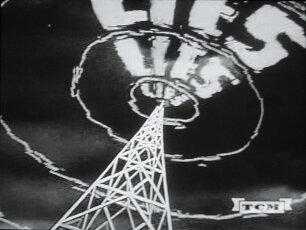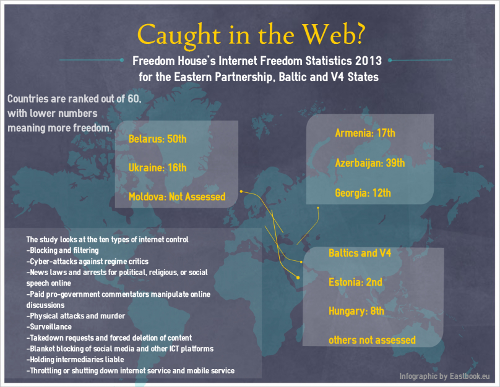Russia is drawing immediate criticism from international censorship and freedom watchdogs after the Russian parliament approved new laws restricting internet usage in Russia last week. It is one piece of the current puzzle on the future of the net in the region–as multiple discussions are taking place across Europe regarding internet freedom, human rights, and propaganda amid the conflict in Ukraine. Taking a look at Freedom House’s Internet Freedom Index, released in October 2013, could spark some interesting debate, considering the events that unfolded almost immediately after its release. At the time Ukraine ranked highly for its internet freedom, but what does the puzzle look like now?

Old Anti-Propaganda Broadcast. author fliegender. source Flickr
Doing 1984 Proud?
According to the new Russian law, content will be restricted for all blogs, including those on social networks, but the law provides particular conditions for bloggers whose number of “daily readers” exceeds 3,000. In order to obtain this detailed information on bloggers and the traffic on their respective blogs, internet providers and the owners of social networks will be obligated to give this information to the authorities, after which, bloggers will be entered into a special state registry, which will contain detailed information about them, including phone numbers and home addresses. Russian President Vladimir Putin substantiated the need for this new law, telling press last week that the internet is a “CIA project,” and that Russia must “fight for its interests online”…
Russia’s move to corral bloggers was criticised by the Organization for Security and Cooperation in Europe representative on Freedom of the Media, Dunja Mijatović, who said:
“If enforced, the proposed amendments would curb freedom of expression and freedom of social media, as well as seriously inhibit the right of citizens to freely receive and disseminate alternative information and express critical views.”
Moscow Time’s journalist, Victor Davidoff, further comments on the extent of this curbed freedom and its implications, explaining:
“The real Orwellian touch is making bloggers responsible not only for the information in their posts, but also for the information in comments by other users. The law, which will likely be passed, will instantly put Russia in first place for Internet censorship.”
While The Index of Censorship warns that the effect of such measures, while not yet law, can already felt:
“While the amendment has yet to be signed into law, it appears to have already made an impact. Russia’s biggest search engine Yandex has removed its ranking of the country’s most popular bloggers, saying it is because the blogsphere has peaked and is losing ground to social media as a discussion platform. Incidentally, their decision was announced only days before the Duma representatives made theirs.”

Human Rights for Internet Users
The timing of Russia’s decision comes together with the kick-off of the two day long Freedom Online Coalition conference taking place in neighbouring Estonia. The conference, entitled “Free and Secure Internet for All”, is being attended by roughly 450 people representing 60 nations, and headed up by the coalition–which is comprised of a group of governments committed to advancing Internet freedom – free expression, association, assembly, and privacy online – globally.
One of the outcomes of the first day of the conference was the release of “The Guide to Human Rights of Internet Users“. The guide focuses on the human rights on which the internet has the greatest impact: access and non-discrimination, freedom of expression and information, freedom of assembly, association and participation, privacy and data protection, education and literacy, protection of children and young people, and the right to effective remedies for violations of human rights.
The guide has been adopted by the 47 member states of the Council of Europe, and is established based on existing human rights contained in the European Convention on Human Rights and other Council of Europe conventions and directives, and the interpretation of these rights by the European Court of Human Rights.
Estonian Foreign Minister Urmas Paet dedicated his opening words at the commencement of the conference to Ukraine, underscoring the need for the freedom of expression and information, and condemning what he referred to as “online propaganda tools”, Paet elaborated, saying:
“The extensive flow of biased and false information- prepared the ground for military presence and generated the favourable mood for the aggressor. Tragically enough, the arguments used for justifying the annexation had little to do with reality as did the facts fabricated for supporting these arguments”.
Paet explained that “granting the freedom of expression paradoxically also means granting the freedom to spread the false information”, but that the solution should not be cracking down on internet freedom, but educating people in critical thinking.
US Secretary of State, John Kerry, joined the conference via Google+ hangout, and also took the opportunity to address what he sees as the linkage between the issue of Ukraine and the issue of open internet:
“The places where we face some of the greatest security challenges today are also the places where governments set up firewalls against basic freedoms online. As the Ukrainian people are marching toward a democratic future, Russia’s military is massing on the borders. And it’s no coincidence that Russia just forced the founder of its largest social network, Pavel Durov, to flee after he had refused to disclose personal information about the protesters in Ukraine’s Euromaidan.”
Part of the current impetus to the discussion of internet censorship and regulation in the region is obviously linked to the on-going conflict in Ukraine–which has seen both the Russian and US/EU sides accusing the other of blatant propaganda and media manipulation.
The Cross-Over of Battle Frontiers
The role of the internet in coordinating and galvanising civil society during the Euromaidan protests in Ukraine cannot be overlooked. #DigitalMaidan became the number 1 global trend on Twitter in January, adding another element to the protests. So much so that many claimed that information about Euromaidan and the events unfolding was available only on the internet, as local media began a hands-off approach.
How Internet Tools Turned Ukraine’s #Euromaidan Protests Into a Movement http://t.co/9HC2sZAvGV #protest #citizenmedia
— Global Voices (@globalvoices) December 10, 2013
Many have argued that the Ukraine crisis has proven that cyber-warfare is a very real component to modern warfare. Russia and Ukraine apparently launched reciprocal cyber attacks during the referendum on Crimea. Reports have shown that NATO and Ukrainian media websites suffered DDoS (denial of service) assaults during the vote, and that servers in Moscow were hit with retaliatory strikes afterward, on an even larger scale.
The cyber-attacks thus far are considered to be on a small-scale–but some experts fear that this may be only the beginning, and fears for a full-blown escalation are mounting. Other experts, however, that Ukraine has already lost the cyber-battle before it begins. According to Patrick Tucker, journalist at Defense One:
“Ukraine already lost that, too. Russia may have unfettered access into the Ukrainian telecommunication systems according to several experts. It’s access that Russia can use to watch Ukrainian opposition leadership, or, in the event of an escalation in the conflict, possibly cut off telecommunications within Ukraine. Russia has no need to attack that which it already owns…”
Read:
“Russian cyber attacks on Ukraine: the Georgia template”
“Information Wars and Civil Resistance: Network Communities vs. States and Corporations”
“Crowdsourcing Ukraine’s Rebellion”
Meanwhile, many’s eyes are turning to neighbouring Moldova and the breakaway region on Transnistria, as concerns increase about its place in the escalating conflict in Ukraine. In recent years, both Moldova and Transnistria drew attention for cyber-protests of their own–one being a citizen-driven protest using online tools, the other, a protest against the lack of access to those tools.
Moldova launched a Twitter revolution of its own in 2009, when citizens took to the streets to protest the Communist party’s victory in elections, protests largely coordinated by social media sites.
While in July of last year residents in Transnistria gathered in Tiraspol to protest the obstruction of websites critical of the government. Opposition politicians and free-speech advocates demanded an end to the blockage of 10 websites- independent news sites, opposition sites, and discussion forums- which had been made unavailable earlier in the year.
Not to mention…
With the global focus unerringly fixed on Ukraine and Russia, the internet battles of other neighbouring countries are being overlooked. Reporters Without Borders recently released a report entitled Belarus: Apparatus of Repression. The report outlines the various mechanisms whereby the Belarusian regime keeps a firm hold over opposition and freedom of expression online. The report also lists a few examples of journalists who have been forced out of their positions, imprisoned and fined.
With the 2014 Ice Hockey World Championship about to kick off in Minsk, a massive influx of people will be entering Belarus, lending an opportunity to experience using the internet in the country.
Hey, Censorship Can Be Fun!
Along with the new laws, Russia is proposing the establishment of a country-wide intranet, which will be closed to the United States and the European Union. The proposed Russian internet, which is being suggested as a means to stop cyber-attacks and information leaks, is tipped to be called ‘Cheburashka’ after the beloved Soviet cartoon character.
Senator Suggests Naming Russian Internet After Cartoon Creature – http://t.co/ceBmXxNh9B instead of Cheburashka it should be Nu Pogody.
— Katy Pearce (@katypearce) April 30, 2014
The Propaganda Game. See what both sides are saying…
sources: The Moscow Times , Index on Censorship , Council of Europe, Humanrights.gov
